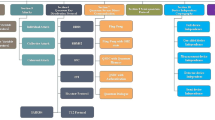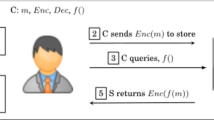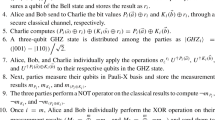Abstract
The secure multi-party quantum multiplication is one of the primitive operations in quantum cryptography that plays an important role to design complex quantum protocols like comparison, sorting, e-voting, etc. The existing multi-party quantum multiplication protocols are efficient, but they have some security issues as these protocols have approach of (n, n) threshold. In this paper, we propose a quantum protocol for secure multi-party multiplication based on the threshold approach of (t, n), where t out of n participants can execute it efficiently. This protocol can execute efficiently if the number of secrets is more than the the number of participants because the secrets are shared among the players using the secret sharing. Moreover, the proposed protocol is more cost-effective and secure as compared to the existing protocols.
Similar content being viewed by others
References
Ma, L., Chang, T., Mink, A., Slattery, O., Hershman, B., Tang, X.: Experimental demonstration of a detection-time-bin-shift polarization encoding quantum key distribution system. IEEE Commun. Lett. 12(6), 459–461 (2008)
Song, D., Chen, D.: Quantum key distribution based on random grouping bell state measurement. IEEE Communications Letters (2020)
Shi, R.H.: Useful equations about bell states and their applications to quantum secret sharing. IEEE Commun. Lett. 24(2), 386–390 (2019)
Mashhadi, S.: General secret sharing based on quantum fourier transform. Quantum Inform. Process. 18(4), 114 (2019)
Sutradhar, K., Om, H.: Efficient quantum secret sharing without a trusted player. Quantum Inform. Process. 19(2), 73 (2020)
Weinstein, Y.S., Pravia, M., Fortunato, E., Lloyd, S., Cory, D.G.: Implementation of the quantum fourier transform. Phys. Rev. Lett. 86(9), 1889 (2001)
Emerson, J., Weinstein, Y.S., Saraceno, M., Lloyd, S., Cory, D.G.: Pseudo-random unitary operators for quantum information processing. Science 302(5653), 2098–2100 (2003)
Zarmehi, F., Houshmand, M.: Controlled bidirectional quantum secure direct communication network using classical xor operation and quantum entanglement. IEEE Commun. Lett. 20(10), 2071–2074 (2016)
Weinstein, Y.S.: Pseudorandom circuits from clifford-plus-t gates. Phys. Rev. A 88(6), 062303 (2013)
Weinstein, Y.S.: Quantum-error-correction implementation after multiple gates. Phys. Rev. A 88(1), 012325 (2013)
Brassard, C., Bennett, C.H.: Quantum cryptography: Public key distribution and coin tossing. In: International conference on computers, systems and signal processing (1984)
Weinstein, Y.S., Chai, D., Xie, N.: Improving ancilla states for quantum computation. Quantum Inform. Process. 15(4), 1445–1453 (2016)
Weinstein, Y.S., Hellberg, C.S.: Energetic suppression of decoherence in exchange-only quantum computation. Phys. Rev. A 72(2), 022319 (2005)
Weinstein, Y.S., Hellberg, C.S.: Effects of symmetries on quantum fidelity decay. Phys. Rev. E 71(3), 035203 (2005)
Shamir, A.: How to share a secret. Commun. ACM 22(11), 612–613 (1979)
Shu, H., Yu, R., Jiang, W., Yang, W.: Efficient implementation of \( k \)-nearest neighbor classifier using vote count circuit. IEEE Transactions Circ. Syst. II: Express Briefs 61(6), 448–452 (2014)
Cheng, S.T., Wang, C.Y.: Quantum switching and quantum merge sorting. IEEE Trans. Circuits Syst. I: Regular Pap. 53(2), 316–325 (2006)
Yang, W., Huang, L., Shi, R., He, L.: Secret sharing based on quantum fourier transform. Quantum Inform. Process. 12(7), 2465–2474 (2013)
Yang, H.Y., Ye, T.Y.: Secure multi-party quantum summation based on quantum fourier transform. Quantum Inform. Process. 17(6), 129 (2018)
Sutradhar, K., Om, H.: A generalized quantum protocol for secure multiparty summation. Express Briefs, IEEE Transactions on Circuits and Systems II (2020)
Shi, R.H., Mu, Y., Zhong, H., Cui, J., Zhang, S.: Secure multiparty quantum computation for summation and multiplication. Sci. Rep. 6, 19655 (2016)
Lv, S.X., Jiao, X.F., Zhou, P.: Multiparty quantum computation for summation and multiplication with mutually unbiased bases. Int. J. Theor. Phys. 58(9), 2872–2882 (2019)
Sutradhar, K., Om, H.: Hybrid quantum protocols for secure multiparty summation and multiplication. Sci. Rep. 10(1), 1–9 (2020)
Weinstein, Y.S., Havel, T.F., Emerson, J., Boulant, N., Saraceno, M., Lloyd, S., Cory, D.G.: Quantum process tomography of the quantum fourier transform. J. Chem. Phys. 121(13), 6117–6133 (2004)
Turner, L.R.: Inverse of the vandermonde matrix with applications (1966)
Author information
Authors and Affiliations
Additional information
Publisher's Note
Springer Nature remains neutral with regard to jurisdictional claims in published maps and institutional affiliations.
Rights and permissions
About this article
Cite this article
Sutradhar, K., Om, H. A cost-effective quantum protocol for secure multi-party multiplication. Quantum Inf Process 20, 380 (2021). https://doi.org/10.1007/s11128-021-03334-3
Received:
Accepted:
Published:
DOI: https://doi.org/10.1007/s11128-021-03334-3




